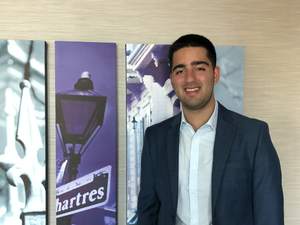
A San Francisco startup that helps brands increase sales by getting their products into retail storefronts has raised new funding.
Crstl (pronounced "crystal") announced a $4.4 million seed round on Tuesday that was led by Mastry Ventures and included Village Global, Alumni Ventures, SuperAngel VC, On Deck, Mensch Capital Partners, Harizury and several individual investors.
Crstl was founded by Dipti Desai in 2021 after she spent several years in product management at a few Bay Area companies, including Uber. It wasn't the career path that she had originally imagined for herself, though.
Desai studied electrical engineering at Virginia Tech and then moved to the Bay Area from the D.C. area to pursue work in hardware engineering before going back to school to study tech policy at UC Berkeley. She thought it would lead to a career working at think tanks but quickly realized that it wasn't what she wanted.
Being in the Bay Area exposed her to startups, and eventually she ended up at Uber where she led various product teams across data, payments and strategy.
She left Uber around the time of its public debut in 2019, shortly before the Covid-19 pandemic unraveled things.
During the early months of the public health emergency, Desai helped a nonprofit organization manage an online storefront to get supplies to frontline workers, and it got her thinking about how complex it must be to manage sales for direct-to-consumer brands that drive sales on platform like Instagram.
It became another data-related problem to solve.
"Across hardware, engineering, startups and policy, one of the common themes was that I was always working on some sort of data product," Desai said.
Crstl uses artificial intelligence to make complex onboarding and compliance processes faster for brands when they expand beyond direct online sales into third-party retailers like Target and Walmart.
The company can work with any size brand, but by the time they turn to Crstl, they've usually had some amount of sales growth and are now ready to expand, Desai told me.
Crstl charges brands monthly or annual subscription fees based on how many retailers they use rather than sales volume. For example, Target would count as a single retailer. A wholesale distributor would also count as one retailer, as would an e-commerce platform like Walmart.com.
Typically, brands would only have two other options, Desai told me.
Either they would need to have in-house software engineers who can manage application programming interfaces (APIs). Or go through a mainstream service provider that manages everything but requires handing over data and charges unpredictable fees.
Crstl also cuts down the time it takes for products to go live in a retailer. Instead of taking up to one year through other options, Crstl can get brands into retailers in one week, Desai said.
"We knew there was a data problem and there was just a lot of opaqueness," Desai said, and "our mission was around clarity, really keeping our customers in mind and what they were wanting to experience differently."
Crstl currently has six employees around the world, and Desai wants to roughly double that as the company grows this year.








